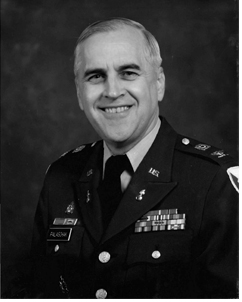Colonel
Richard G. Palaschak
 Richard Palaschak was born
on September 14, 1939, in McKeesport, Pennsylvania. He graduated in 1964 from Pennsylvania State University, was
commissioned an Ordnance officer, and graduated from the Ordnance Officer Basic and Ammunition Officers Courses at
Aberdeen Proving Ground (APG), Maryland. From 1967 to 1968, he commanded the 1st Enlisted Training Company at
APG. Then, he was assigned to the 336th Ordnance Battalion, where he commanded the Headquarters and Headquarters
Company first at Fort Carson, Colorado, and then in South Vietnam. While in Vietnam, he took command of the 40th
Ordnance Company (Ammunition).
Richard Palaschak was born
on September 14, 1939, in McKeesport, Pennsylvania. He graduated in 1964 from Pennsylvania State University, was
commissioned an Ordnance officer, and graduated from the Ordnance Officer Basic and Ammunition Officers Courses at
Aberdeen Proving Ground (APG), Maryland. From 1967 to 1968, he commanded the 1st Enlisted Training Company at
APG. Then, he was assigned to the 336th Ordnance Battalion, where he commanded the Headquarters and Headquarters
Company first at Fort Carson, Colorado, and then in South Vietnam. While in Vietnam, he took command of the 40th
Ordnance Company (Ammunition).
Returning to the States in 1969, Palaschak served as the Ammunition Production and Procurement Officer, Frankfort Arsenal, Pennsylvania. After he earned a Master of Science degree in Physics from New Mexico State University in 1974, he was subsequently assigned as Physicist and then as a Test Program Director for the Defense Nuclear Agency in Albuquerque, New Mexico.
In 1977, Palaschak was reassigned to Frankfurt, Germany, to serve as Division Ammunition Officer for the 3rd Armored Division. From 1983 to 1985, he commanded the Lake City Army Ammunition Plant, Independence, Missouri. Following command, he was assigned first as Assistant Deputy Chief of Staff for Conventional Ammunition, and then as Chief, Ammunition Program, Management Division, US Army Materiel Command.
Colonel Palaschak culminated his military career as Deputy Commander, Armament Research, Development, and Engineering Center, Picatinny Arsenal, New Jersey, where he accelerated the fielding of several armament and munitions systems in support of the 1990-1991 Gulf War. He retired in 1993 after 29 years of distinguished service, but his contributions to the country’s ammunition infrastructure were just beginning.
Following retirement, Palaschak accepted the position of Director of Operations for the newly established Munitions Industrial Base Task Force. The Task Force, a non-profit trade association comprised of 18 companies involved in the munitions business, was formed in response to a perceived impending crisis in munitions production. By fiscal year 1994, the military’s budget for production, research, and development of ammunition had fallen so low that the country’s ammunition infrastructure was threatened. The goal of the Task Force was to educate Congress and the administration on the situation and to secure adequate funding and policies to maintain a responsive, capable munitions industrial base.
To identify the nature and extent of the problem, Palaschak directed an assessment of the United States conventional munitions. This study laid out the funding needed for ammunition procurement, research, and development to keep the ammunition base healthy. Palaschak briefed members of Congress and the military and personally testified before Congressional committees on the report’s recommendations. His efforts have been instrumental in increasing awareness of the importance of ammunition production capabilities and the need to fund the ammunition base to ensure our military has a sufficient supply of the latest munitions to fight America’s wars.